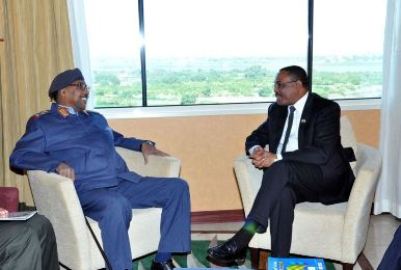Ethiopian PM attempts to provide impetus to peace between two Sudans
December 26, 2012 (KHARTOUM) – The Ethiopian Prime Minister, Hailemariam Desalegn visited Sudan on Wednesday to discuss with the Sudanese officials how to resolve contentious issues between Khartoum and Juba over the implementation of a security agreements deal signed in September.

Desalegn met following his arrival to Khartoum with the President Omer Al-Bashir. After the meeting, the Sudanese State Minister of Foreign Affairs, Salah Wanasi, told reporters in Khartoum that “the talks highlighted the relationships between the countries, [and] the role of Ethiopian peacekeepers in Abyei, a disputed area between Sudan and South Sudan”.
Following a deal on the interim arrangements for the administration and security of Abyei signed on 20 June 2011, Ethiopia deployed a 4000- strong force and the two parties pulled out their troops to avoid clashes between the two sides.
The Ethiopian Prime Minister, on the other side, discussed with Sudanese Defence Minister, Abdel-Rahim Mohamed Hussein the obstacles hindering the implementation of the security agreement, including the issue of Sudanese rebels in the Blue Nile and South Kordofan states,
The Sudanese Defense Minister said after the meeting: “Sudan has appreciated the vital role that has been played by Ethiopia to converge the different views and find ways to implement the agreements between Sudan and South Sudan”.
Abdel-Rahim further said that the Security Arrangement is the foundation of continued collaboration with South Sudan.
Sudan and south Sudan signed on 27 September nine agreements labelled “Cooperation Agreement” including a security deal providing to establish a buffer zone on the disputed areas on the common border and to end their support to rebel groups from both sides.
The after a series of talks in Juba Khartoum and Addis Ababa, they agreed to establish the demilitarized zone but they failed to reach a compromise on how to deal with rebels issue. Khartoum proposed to extend the buffer zone to the common border to include Blue Nile and South Kordofan, but Juba rejected the idea, as it is not provided in the signed agreement.
Desalegn will visit Juba on Thursday to hold similar discussions with South Sudan President Salva Kiir and other members of the government in Juba.
Addis Ababa has continued facilitating the peace process between South Sudan and Sudan since the death of Ethiopia’s former Prime Minister, Meles Zenawi in August 2012 who had been active in bringing to two parties together until the months before he passed away.
Zenawi played a key role in the deal signed on 20 June 2011 on Abyei after its seizure by the Sudanese army in May 2011.
Sudan and South Sudan have failed to reach an agreement on who has right to participate in a referendum – agreed as part of the CPA – to decide whether the disputed area of Abyei remains in North or is transferred into newly-independent South Sudan.
The African Union Peace and Security Council (AUPSC) endorsed a proposal made by the African mediation by Thabo providing to hold a referendum in Abyei by October 2013 without the participation of the Misseriya nomads who traditionally enter the area to graze their cattle for some of the year.
Sudan has rejected excluding the Misseriya but AUPSC in a meeting held in December reiterated its support to the proposal and referred that the proposal to a meeting the Council will hold in January at the level of heads of states a and governments.
(ST)
